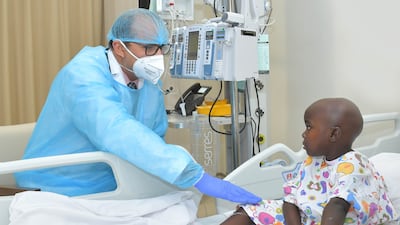The success story of two young children who were the first to receive paediatric bone morrow transplants in the UAE was shared at an event in Abu Dhabi.
Burjeel Medical City’s bone marrow transplant unit, which was inaugurated in the capital in September, carried out the procedures on Jordana, 5, and Ahmed Daoud Al Uqabi, 2, just two weeks apart in April.
Both are now on the road to recovery and act as examples of the life-saving work being performed under a landmark health strategy.
Previously patients in the Emirates requiring bone marrow transplants would have to seek medical treatment abroad.
In the next two years, doctors hope to cut by half the number of patients needing to undergo such transplant procedures.
They spoke of efforts to drive forward the country's health sector at the first Emirates Paediatric Bone Marrow Transplant Congress in Abu Dhabi on Friday.
Vital lifeline for children

Two-year-old Ahmed Daoud Al Uqabi was the first child with thalassemia, a genetic defect in the composition of haemoglobin, to receive a bone marrow transplant at the Burjeel unit. His donor was an older sibling.
He had travelled to the Emirates from Iraq for treatment, highlighting the UAE's mission to deliver world-class health care and become a centre for medical tourism.
Jordana, 5, from Uganda, who has sickle-cell anaemia, benefited from a matched sibling transplant that involved her receiving healthy stem cells from her sister Jolina, 10.
Her sister attended the Abu Dhabi conference, along with their mother.
The allogeneic stem cell transplant involves transferring healthy blood stem cells from a donor to replace a patient’s diseased or damaged bone marrow.
The complex procedure requires collecting stem cells from the donor's blood, bone marrow within a donor's hipbone, or from the blood of a donated umbilical cord, before transferring them to the patient.
Dr Zainul Aabideen, head of paediatric haematology and oncology at BMC, said after Jordana's surgery that she had endured great pain and suffering in her life.

“The only curative option for this life-threatening condition is bone marrow transplantation," Dr Aabideen said.
"Prior to this procedure, there would have been immense suffering for the patient. The entire care team here at the hospital, as well as the child’s parents, are delighted that the transplant will remove this pain from her life.”
Just the start for burgeoning programme
Both Ahmed and Jordana are on the road to recovery and medics have their sights set on helping hundreds more like them.
"Abu Dhabi is currently distinguished by the application of the highest standards used in the treatment of bone marrow transplantation," said Dr Fatima Al Kaabi, director of the Abu Dhabi Bone Marrow Transplant Programme at the Abu Dhabi Stem Cell Centre.
"Providing these distinguished services in the country makes it easier for us as specialists in this field to provide medical care ... in addition to reducing costs compared with treatment abroad.
"We expect, during the next two years, with the presence of bone marrow transplants for children, to reduce requests for treatment abroad for these cases to 50 per cent.”

